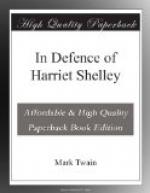Peacock, a scholar, poet, and friend of the Shelleys, was of their party when they went away. He used to laugh at the Boinville menagerie, and “was not a favorite.” One of the Boinville group, writing to Hogg, said, “The Shelleys have made an addition to their party in the person of a cold scholar, who, I think, has neither taste nor feeling. This, Shelley will perceive sooner or later, for his warm nature craves sympathy.” True, and Shelley will fight his way back there to get it—there will be no way to head him off.
Towards the end of November it was necessary for Shelley to pay a business visit to London, and he conceived the project of leaving Harriet and the baby in Edinburgh with Harriet’s sister, Eliza Westbrook, a sensible, practical maiden lady about thirty years old, who had spent a great part of her time with the family since the marriage. She was an estimable woman, and Shelley had had reason to like her, and did like her; but along about this time his feeling towards her changed. Part of Shelley’s plan, as he wrote Hogg, was to spend his London evenings with the Newtons—members of the Boinville Hysterical Society. But, alas, when he arrived early in December, that pleasant game was partially blocked, for Eliza and the family arrived with him. We are left destitute of conjectures at this point by the biographer, and it is my duty to supply one. I chance the conjecture that it was Eliza who interfered with that game. I think she tried to do what she could towards modifying the Boinville connection, in the interest of her young sister’s peace and honor.
If it was she who blocked that game, she was not strong enough to block the next one. Before the month and year were out—no date given, let us call it Christmas—Shelley and family were nested in a furnished house in Windsor, “at no great distance from the Boinvilles”—these decoys still residing at Bracknell.
What we need, now, is a misleading conjecture. We get it with characteristic promptness and depravity:
“But Prince Athanase found not the aged Zonoras, the friend of his boyhood, in any wanderings to Windsor. Dr. Lind had died a year since, and with his death Windsor must have lost, for Shelley, its chief attraction.”
Still, not to mention Shelley’s wife, there was Bracknell, at any rate. While Bracknell remains, all solace is not lost. Shelley is represented by this biographer as doing a great many careless things, but to my mind this hiring a furnished house for three months in order to be with a man who has been dead a year, is the carelessest of them all. One feels for him—that is but natural, and does us honor besides—yet one is vexed, for all that. He could have written and asked about the aged Zonoras before taking the house. He may not have had the address, but that is nothing—any postman would know the aged Zonoras; a dead postman would remember a name like that.




